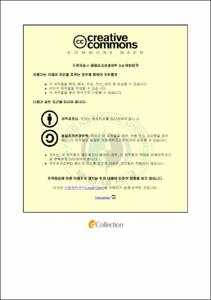태권도장 경영자의 리더십유형이 조직성과에 미치는 영향에 관한 연구
- Alternative Title
- A study on the effect of the leadership of Taekwondo gym managers on organizational performance
- Abstract
- A study on the effect of the leadership of Taekwondo gym managers on organizational performance
Dong-Su Kim
Department of Business Administration
Graduate School of Business Administration
Pukyong National University
Abstract
The purpose of this study is to provide preliminary data for the management of the Taekwondo gyms by analyzing the leadership types of Taekwondo gym managers through the survey of instructors at each gym for the development of the gyms and successful management results, analyzing the effect relationship of trust in the relationship between the organizational commitment and job satisfaction of the instructors, and verifying how the leadership types of Taekwondo gym managers affect to the organizational performance. The contents of the study are as follows.
First, this study provides the leadership types of Taekwondo gym managers.
Second, this study analyzes how the leadership types of Taekwondo gym managers affect to the organizational performance.
Third, this study analyzes the effect relationship of trust in the relationship between the leadership types of Taekwondo gym managers and organizational performance.
For the empirical analysis, 250 surveys were distributed to Taekwondo instructors working at gyms in Busan and Gyeongsangnam-do from July 21, 2014 to August 8, 2014. 220 surveys, which account for 90 % of the survey distributed, were returned. Excluding 15 surveys considered to have intentional omissions in the answers or insincerity answers, 205 surveys were used to carry out analysis.
Confidence was verified by use of Cronbach’s ∂ Coefficiency and validity was analysed by factor analysis. For the empirical analysis, statistical analysis, correlation analysis, multi regression analysis, and hierarchical regression analysis were conducted by using SPSS 12.0.
The results of the analysis are summarized as follows.
First, with respect to the effect of the leadership types on the organizational performance, the analysis showed that inspiring the spirit of exertion, which is the subordinate component of transformational leadership, has an effect on the organizational commitment and job satisfaction, and conditional compensation, which is the subordinate component of transactional leadership, also has the organizational commitment and job satisfaction. When both transformational and transactional leadership were shown, inspiring the spirit of exertion has an effect on the organizational commitment and job satisfaction. In addition, exceptional management, which is subordinate component of transactional leadership, has a negative effect on the organizational commitment and job satisfaction.
Second, examining the moderator effect of trust concerning the effect by leadership types on the organizational performance, there was a moderator effect between trust and the organizational performance.
In conclusion, the effects of leadership of the Taekwondo gym managers on the organizational performance are partly affected by leadership types. Thus, a leader should not show only one leadership type but the leader should develop various types of leadership through systematic training to show appropriate leadership in each circumstance, which would in turn enforce the competitiveness of Taekwondo gym manager.
- Issued Date
- 2015
- Awarded Date
- 2015. 2
- Type
- Dissertation
- Publisher
- 부경대학교 경영대학원
- Alternative Author(s)
- Kim, Dong Su
- Affiliation
- 경영학과
- Department
- 경영대학원 경영학과경영학전공
- Advisor
- 류태모
- Table Of Contents
- [목 차]
제 1 장 서론 1
제 1 절 문제 제기 및 목적 1
제 2 절 연구 방법 및 논문 구성 4
제 2 장 이론적 배경 6
제 1 절 태권도장 경영의 개념 6
제 2 절 태권도장 경영의 구성요소 7
1. 태권도 지도자 7
2. 시설 및 환경 8
3. 프로그램 8
제 3 절 리더십에 대한 이론적 고찰 10
1. 리더십의 정의 10
2. 변혁적 리더십 12
3. 거래적 리더십 18
제 4 절 조직성과에 대한 이론적 고찰 21
1. 조직성과의 개념 21
2. 조직몰입에 관한 이론적 배경 22
3. 직무만족 28
제 5 절 신뢰에 대한 이론적 고찰 33
1. 신뢰의 개념 및 유형 33
2. 리더에 대한 신뢰 36
3. 조직에 대한 신뢰 39
제 6 절 선행연구의 검토 42
1. 리더십과 조직성과 42
2. 리더십과 신뢰와의 관계 45
3. 신뢰와 조직성과 간의 관계 47
4. 조직 몰입의 선행 연구 49
제 3 장 연구 방법 52
제 1 절 연구모형 및 가설 설정 52
1. 연구모형의 설정 52
2. 가설의 설정 53
제 2 절 변수의 조작적 정의 55
1. 리더십 56
2. 조직성과 57
3. 신뢰 58
제 4 장 실증 분석 및 결과 59
제 1 절 조사 연구 방법 59
1. 연구대상 및 자료수집 방법 59
2. 자료 분석 방법 59
3. 인구 통계학적 특성 61
제 2 절 신뢰성 및 타당성 분석 62
제 3 절 가설 검증 66
1. 리더십 유형과 조직 성과와의 관계 66
2. 리더십 유형과 조직 성과와의 관계에 있어 신뢰의 역할 67
제 5 장 결론 69
제 1 절 연구결과의 요약 및 시사점 69
1. 연구결과의 요약 69
2. 연구의 시사점 71
제 2 절 연구의 한계 및 향후 연구 방향 71
참고문헌 73
설문지 77
ABSTRACT 84
- Degree
- Master
- Appears in Collections:
- 경영대학원 > 경영학과-경영학전공
- Files in This Item:
-
-
Download
 태권도장 경영자의 리더십유형이 조직성과에 미치는 영향에 관한 연구.pdf
기타 데이터 / 1.18 MB / Adobe PDF
태권도장 경영자의 리더십유형이 조직성과에 미치는 영향에 관한 연구.pdf
기타 데이터 / 1.18 MB / Adobe PDF
-
Items in Repository are protected by copyright, with all rights reserved, unless otherwise indicated.